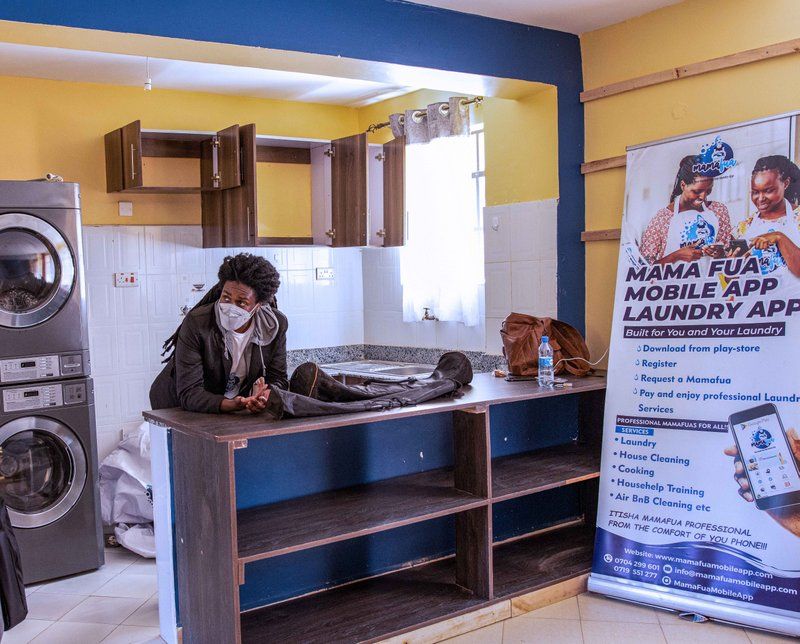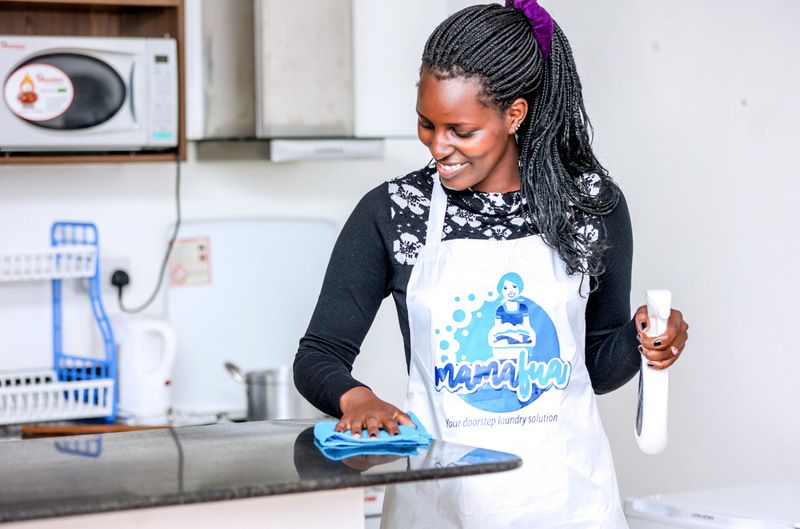Features
How Domestic Work is Going Digital in Africa
By Mical Imbukwa, bird story agency

Nancy Wanjiku, 27, a resident of Kayole Estate, an informal settlement some 15 kilometres from the Nairobi Central Business district, is normally up by 3.30 am.
She has to prepare her child for school and clean her house before setting out to scout for a cleaning job in the city’s middle and high-income estates. She has to be at the bus stop by 5.30 am to catch the early bus to town to beat the morning traffic and take advantage of more affordable fares before the 7-9 am peak hours.
Preparing to spend the little money she has saved from her day’s previous job, she sets out unsure of whether she will be lucky enough to land a job; whatever happens, she is in for a costly scouting trip.
Most of her money goes on transport to far-flung estates where she believes she will find work. Some days she is lucky, others not.
“There are days I have spent about KSh200 (US$2) on transport, to and from estates such as South B, only to return home with a profit of about KSh300 (US$3). It’s not easy,” she notes.
Wanjiku is among the thousands of women in Kenya’s urban areas who are caught in an endless cycle, trying to eke out a living in challenging economic times. Unofficial statistics put the number of domestic workers in Kenya at 2 million. That compares to around 1.7 million in South Africa, over 2 million in Nigeria (1.9 million in a 2007 survey) and many more in other African economies like Egypt, Ghana and Ivory Coast.
Part-time domestic workers like Wanjiku are increasingly reliant on a new generation of employers. These younger working families live in middle and high-income estates and prefer to hire housekeepers on a daily basis as opposed to retaining regular, live-in domestic workers for help in the home.
But thanks to technology, the fortunes of these workers are beginning to change.
An app – Mama Fua – launched by 27-year-old Stephine Ngutah, is just one of a wave of African apps that promise to dignify the domestic workers’ trade by ensuring that they get proper training, have job IDs, get consistent jobs, establish a saving and investing culture, and only work with people who mean business.

Stephine Ngutah, Founder Mama Fua having a conversation with a colleague. Photo Courtesy : Stephine Ngutah
To enrol on Ngutah’s Mama Fua app, would-be domestic workers need a smartphone to enter their contacts and profile. This enables those requiring the services to pick who they want and indicate the services they require.
Customers can locate Mama Fua domestic workers in their vicinity, view their profiles, and decide on whom to pick. They then select the services required, which have different metrics and are charged per hour.
“It is like a hailing taxi that charges according to the pick-up and drop points. The app charges according to the services and time spent in accomplishing the chosen household chores requested,” explained Ngutah.
The typical customer is upper-middle class and includes young professionals. These customers want quick and efficient service and are not interested in someone to cook, clean, iron and look after children from early morning until late at night. Even laundry is an itemised service on the app.
“There is also the itemised option which shows the various laundry items with prices attached. So, one clicks on the item they are interested in, then determines the quantity.”
Only after payment and check-out is the would-be employer provided with the contact details of the Mama Fua domestic worker. This prevents opportunities for gender-based violence and “ensure that only serious users access the Mama Fuas,” according to Ngutah.

Currently, there are between 2,500 and 3,500 Mama Fua domestic workers who have subscribed to the app, which has a hotline facility in case of a security breach to both service providers and clients.
Ngutah and his co-founders, Zachary Ramogo and Ruth Wamboi Gasson, worked closely with law enforcement authorities to develop security responses. The app comes with some legal services built in, helping to mitigate risk for both customer and worker.
“We also have a legally enforced E-contract on the app that binds both the client and the Mama Fua,” said Ngutah.
This is crucial to attempts to regulate the industry, according to Chukwuma Ikwegani, a financial expert from Nigeria, who noted that some employers take advantage of discriminatory social hierarchies to mete out inhumane treatment to domestic workers.
In many cases, this type of abuse is facilitated by agents acting as middlemen between employers and domestic workers.
Beryl Omondi, a businesswoman and mother of three initially used agents to engage a domestic worker. She was, however, disturbed by what she saw as exploitation of the workers, usually unskilled and vulnerable. On top of that, workers initially didn’t know what to do.
“The disadvantage is that I have to train my house help,” she said. For a woman on the go, this was a major problem.

Across Africa, app-based employment agencies are coming to the rescue. In South Africa, for instance, apps such as SweepSouth are changing the dynamics of domestic work. Homeowners are now able to access experienced and fully vetted domestic workers or gardeners in the comfort of their homes.
The costs of service on this app are based on the size of the home and the work needed to be done. The platform also has a dedicated feature for Airbnb hosts who can book a specialised cleaner for specialised services.
The Cape Town-based, on-demand home cleaning and services platform recently raised funds to expand into new markets and grow its existing operation, nine months after concluding the acquisition of Egyptian home services platform FilKhedma, according to techcentral.com.
Already, the Mama Fua app has become widely popular in Kenya’s Eldoret, where it was launched. According to Ngutah, this is in part due to the comparatively high earnings for domestic workers using the app. Mama Fua workers currently engaged in Eldoret through the app are in some instances earning better than regular office workers, according to Ngutah.
“Some Mama Fuas earn between US$10 and 20 a day, which translates to about US$300 monthly. They are also advantaged because they don’t spend on transport for they are located in their vicinities and only spend on lunch when they want to,” he said.
The app is soon be launched in parts of Nairobi, potentially bringing relief to domestic workers like Nancy Wanjiku.















